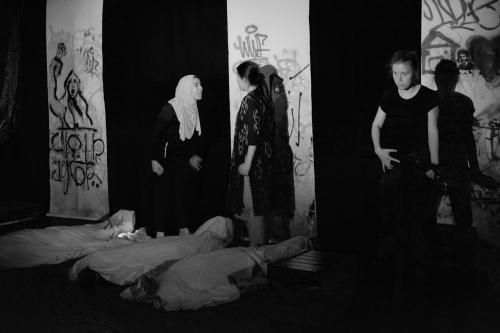
Spotlighting Bread Theatre & Film Company
Article
Bread formed in the summer of 2019 with the aim of diversifying the casts, crews, and writing staged in Cambridge.
Martha French
Cambridge Creatives catches up with Vidya Divakaran, president of Cambridge-based company Bread
Bread, formed in the summer of 2019 with the aim of diversifying the casts, crews, and writing staged in Cambridge, has quickly become one of the most prolific and well-respected societies in the theatre scene. Current president, Vidya Divakaran, joined the society in her first term of her first year, as they were funding a comedy show called ‘Second Generation: Integrated’ with an all BME cast and crew. She got on board as set designer with “literally no experience whatsoever, but the fact it was promoting inclusivity so boldly is what got me involved, because I knew that I’d be meeting people with similar backgrounds and feel more confident”.
It is this security, this promise of diversity that makes Bread so special, for - as Vidya summarises - “We’re open about how we want more inclusivity, about how we want more diverse casts and crews, we fund narratives that have been written by people of colour. Our aims are quite clear [...] The reason we’re called bread is because of a quote, included in the society’s logo, which says ‘Poetry, like bread, is for everyone. We want Cambridge theatre and film to be for everyone, because at the moment there are quite a few barriers that stop people wanting to be involved, which could be nepotism, or implicit bias, or explicit bias, if roles are simply just off-putting for people of colour, and that’s not just cast but crew, where it feels like it’s hard to start from nothing - but training from the ADC is always available if you ask!”
The problem of ‘experience required’ and its implications drives so much of Vidya and Bread’s work, founded on the belief that “there’s an intersectionality between class and race, where people of colour may have come from backgrounds where they didn’t have that cultural capital of going to the theatre much, or their parents talking about Chekhov or whatever, or never reading Shakespeare outside of English GCSE. It’s these little things that build up and put you off from going into that audition confident that you have a chance, because in the scene we often see cast lists and are all like ‘Oh that makes sense!’ But why does that make sense? Why are we assuming that people with a certain experience, or identity - well, race, essentially - are more likely to be cast or involved or included and encouraged?”
Since its establishment, Bread has produced eight shows, from a musical theatre bar night to an entirely devised monologue series, which Vidya herself was involved in: “Last term, we did do a show that I think really changed the scene, it was called ‘The Trouble With Today’s Women’ and it was completely devised by a really diverse group of women, mainly of colour, and it touched upon their personal experiences through character monologues in a surrealist dinner party that was chaotic and full of energy. I’d never seen anything like it on stage, especially at the ADC, and hopefully it’s going to lead onto more devised theatre in Cambridge”. The show, its title a play on Sudha Buchar’s ‘The Trouble With Asian Men’, was developed through interviews and workshops, and ran for two nights at the end of last term.
This interest in involvement in the process means Bread is - as Vidya explains - “slightly different to other theatre societies, which function effectively as funding bodies. We do fund shows that are trying to push the boundaries of Cambridge Theatre, this term we’re co-funding a show called ‘Great Mother - Iya Ayaba’ which is written by a student, her name is Mojola Akinyemi, who’s so so talented, and it’s going to be an amazing watch. But we also try to create a more inclusive community in the theatre scene, and we do this through socials after shows, we have workshops collaborating with other societies (most recently the Footlights) as well as professionals, trying to let people break out of the scene”.
So what’s next for Bread? In the future they’re aiming to fund more film projects, “promoting narratives that haven’t been told yet by script writers of colour”, and at the moment Vidya is working on pitching the third installment of ‘Second Generation’, the show that started it all for her Bread journey, “which will be really fun, because it really does give so many people - especially from minority backgrounds - the opportunity to get into comedy”.
In terms of celebrating Black History Month in Cambridge, Vidya recommends that everyone attend this week’s mainshow, ‘Pass Over’ at the ADC: “It’s written by a woman of colour, it’s a big show, it’s been on Broadway and in London, and Antoinette Nwandu is such a brilliant writer, the piece is so lyrical, so moving, and so relevant to today. It’s about two black men who live on the edge of a block, and how their hope faces against a white intruder who disrupts their lives and attempts to get off that block. It’s a really important watch, or even read!”
Bread doesn’t have formal membership, but anyone interested in attending their workshops and shows can keep up with them via their website, social media, or mailing list.